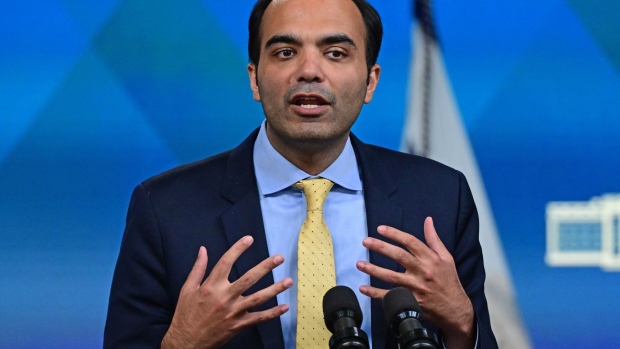Oct 6, 2022
US to Step Up Crackdown on Wall Street, Big Tech Consumer Issues
, Bloomberg News

(Bloomberg) -- The top US consumer watchdog has a message for financial firms and tech giants already reeling from a crackdown in Washington: there is more to come.
A year into the job and just a week after the US Chamber of Commerce and bank trade associations sued his agency over its approach, Consumer Financial Protection Bureau Director Rohit Chopra says he has no plans to ease up. Chopra, who was appointed to the job by President Joe Biden, has drawn the ire of business groups and GOP lawmakers for dialing up the agency’s enforcement program and changing some exam criteria.
“I am not spending my time trying to make friends with every Wall Street CEO,” Chopra said Thursday during an interview in Bloomberg’s Washington office. The consumer regulator, he said, would continue to focus on large, repeat violators of its rules.
The CFPB has been a political lightning rod since its creation following the 2008 global financial crisis. Democrats have touted the agency as a necessary check on corporate power and a guardian of ordinary Americans with whom its popularity may grow if the US economy goes into a recession. But it has also been reviled by some Republicans and businesses groups who claim the agency lacks accountability.
After the regulator dialed back its efforts during the Trump era, Chopra rankled industry by taking a more aggressive tact. In one ongoing dust-up, the Chamber of Commerce, American Bankers Association and the Consumer Bankers Association sued the agency last month for giving inspectors more leeway to classify a lending decision as discriminatory.
The groups said the regulator lacked the authority to make the changes it did to its exam criteria. The Chamber of Commerce said the move “will likely result in the disappearance of products consumers currently enjoy and benefit from,” potentially some no-fee checking accounts.
Chopra didn’t comment directly on the lawsuit, which alleged that the CFPB overstepped its authority in making the changes, but said his agency was generally willing to go to court to defend its decisions.
“They just want us to be a dead fish -- we are not going to do that,” he said, referring to industry complaints that his agency hasn’t been transparent in its efforts. “We don’t get distracted from the soap opera side.”
Under his tenure, major enforcement actions have been brought, including one against Regions Financial Corp. for allegedly charging clients illegal overdraft fees for almost three years. Regions, which the CFPB said was a “repeat offender,” didn’t admit or deny the alleged wrongdoing and said at the time that it disagreed with the agency’s characterizations.
In April, the CFPB alleged that TransUnion, the credit-reporting giant, misled consumers through false advertising. At the time, Chopra said the company was “an out-of-control repeat offender” after it was fined in 2017 for similar violations. The company said then that the CFPB’s claims were “meritless,” adding that its marketing practices had complied with CFPB regulations.
On Thursday, Chopra ticked off a list of potential areas of concern for the agency, including auto lending and peer-to-peer payments.
He also said his agency will step up oversight of tech platforms offering payment services, with a focus on potential privacy issues tied to client information. Last year, it ordered Amazon.com Inc., Meta Platforms Inc. and other large companies to turn over information about how they gather and use consumer payment data.
The agency said in a report last month that it may need to issue guidance or a rule to better scrutinize “buy now, pay later” products, which allow customers to make purchases immediately but spread out payments over future installments. In addition, Chopra said rising vehicle prices may soon help push outstanding debt from auto loans up by another $100 billion, hurting consumers’ ability to pay for other expenses. He said his agency is closely monitoring the situation.
Payment Scams
Payment scams related to peer-to-peer systems like Zelle and Venmo are also an increasing problem, he said. Under current rules, if a hacker logs into a customer’s bank account and sends money, companies are required to provide a refund. But fraudsters have increasingly sought to use networks such as Zelle to persuade consumers to send them money. In such cases, banks aren’t required to make consumers whole.
The CFPB is weighing steps it could take to address this issue, Chopra said. Zelle, which counts several large banks among its owners, came under scrutiny during recent congressional hearings where bank chief executive officers testified. Lenders say they’re already working on a fix: closing accounts of customers who receive the fraudulent funds.
During the interview, Chopra said the CFPB will in the coming weeks advance on its long-awaited “open banking” measure, a move to allow consumers to easily share their financial data with third-parties. Backers of the changes say it will remove a key obstacle for people switching service providers. Chopra said the agency is preparing for future industry changes in payments and lending that could affect consumers and the US economy more broadly.
“My job is to be paranoid about what is coming and what could happen,” he said.
(Updates context around lawsuit in sixth paragraph. An earlier version corrected the name of Consumer Bankers Association trade group.)
©2022 Bloomberg L.P.


